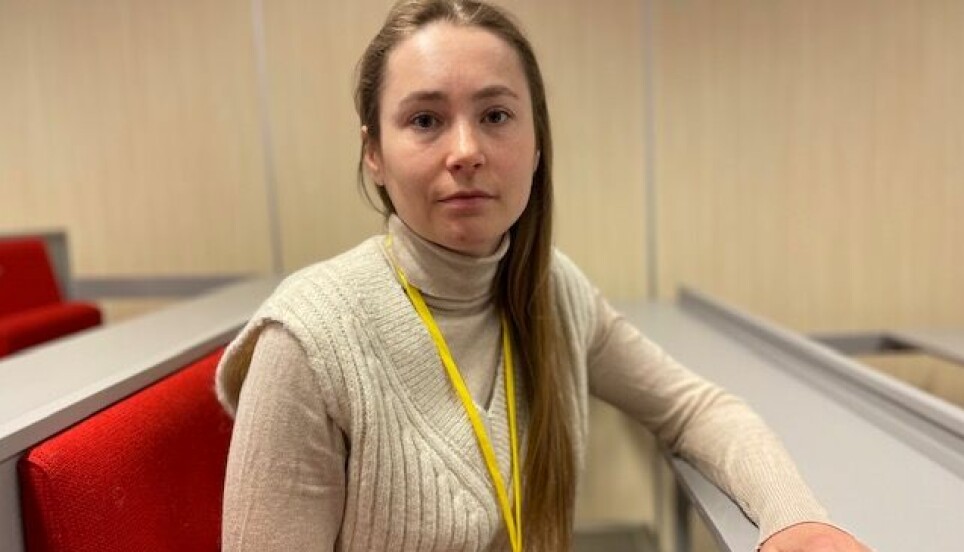
Ukrainian sociologist fled to Oslo: "Its really hard for me to be here, even though I'm safe"
She managed to cross the border from Ukraine to Poland by foot. Now sociologist Oleksandra Deineko works as a guest researcher at OsloMet.
Oleksandra Deineko usually works as an associate professor at Karazin University in Kharkiv, one of the largest universities in Ukraine.
Now, she’s a guest researcher at OsloMet, working with colleagues that she has collaborated with since 2018. They have found office space for her, as well as a place to stay, while war ravages her home country.
Bombs exploding around the train
She wasn’t planning on leaving.
“When the war started, I decided to stay. But after eight days of attacks against my city, my parents insisted I needed to get out of Kharkiv. I have no relatives or friends abroad, so I wrote an email to Aadne Aasland in Oslo, whom I had collaborated with for several years”, Deineko says.
Aasland’s field of research is social welfare, migration, ethnicity and diversity – with a particular focus on Russia, Ukraine and the Baltic countries. He works at OsloMet.
Deineko asked if it might be possible to come to Norway and assist the work at The Norwegian Institute for Urban and Regional Research (NIBR) located at OsloMet.
“He responded very quickly saying that I was welcome. So I left on a three day journey from Kharkiv to Oslo.”
The train ride from Kharkiv to Lviv was dangerous.
“There were many hard attacks against the city that day. When we boarded the train, we heard bombs exploding around us”, Deineko says.
The train was packed with people. The toilets were out of function, and it was not possible to buy any food during the 24 hour long journey.
“But all of us on board shared whatever food we had”, she says.
Fled with the help of colleagues
A colleague in Lviv, also a sociologist, helped Deineko find the best and fastest way to cross the border into Poland.
Within a few hours of walking, she was there, in Poland. Here, another colleague organized a ride to take her from the border and to the capital Warsaw. Colleagues from OsloMet had arranged for a flight from Warsaw to Oslo.
“Colleagues that I have collaborated with on research have helped me throughout my entire flight,” a clearly moved Deineko says.
Norwegian researchers at NIBR from OsloMet have been to Ukraine to do field work on numerous occasions.
Among other things, they have studied decentralization and language in the country.
Deineko is now a part of the research team based in Oslo and will continue to contribute to NIBRs studies on living conditions in Ukraine during the war.
- You can read more about this research in the article Fewer than 1 per cent of Ukrainians believe Russia will win the war.
Family still in Ukraine
Oleksandra Deinekos family is still in Ukraine.
“My parents won’t leave Kharkiv because my grandmother is disabled. It’s not possible to get her out of the country. They live in the middle of the city and are under constant attacks. But they are alive and they are healthy. Luckily I have had the opportunity to be in touch with them several times a day”, she says.
The research that Deineko and colleagues at NIBR presented this week, is based on a survey among Ukrainians which was done after the war started.
Ukrainians in and outside Ukraine have answered questions about their mental health.
The research finds that the levels of stress and anxiety among those who have fled the country are in fact higher than among those who have stayed.
Encourages collaboration
Deineko can attest to this being true also for her.
“It’s really hard to be here, even if I am safe. All my thoughts are still back home in Ukraine. But I have found ways of working around this. Now that I am here, I am actively trying to help students and researchers back home,” she says.
Deineko believes that if researchers in other countries can help their Ukrainian colleagues, the help will be more to the point.
“Most researchers in Ukraine still have electricity, and access to the internet, so they can do research. But their financial situation is extremely strained. If researchers in Norway, no matter the subject, have projects where colleagues from Ukraine could be involved, then I encourage them to do so, to help. It helps keep the spirit and motivation alive, if you feel that you are not alone”, she says.
Firm belief in victory
The new research from NIBR and Ukrainian collaborators shows that nearly all Ukrainians believe in a Ukrainian victory in this war.
Deineko is one of them.
“I believe it’s only a matter of time before we will have won, with good help from the international society”, she says.
The day the war ends, she will be returning to an even stronger Ukraine, Deineko believes.
“The war has made us stronger. Everybody is helping each other, no matter if they are friends, family or foreigners. No matter what language or skin colour,” the sociologist says.
“I am certain the Ukraine will rise again after this war, and become a part of the EU," she says.
Translated by: Ida Irene Bergstrøm
---
Read the Norwegian version of this article on forskning.no
































